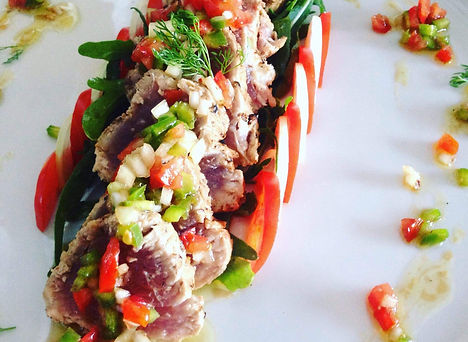

Menu Bar Restaurant

Restaurant
& Drinks
.jpeg)

Good food is a good mood
Tienne Del Mar will introduce you to the gastronomic world of Santo Antão. The region of Paúl is rich in natural resources and is very proud of its regional cuisine. Tienne Del Mar is located right at the Atlantic Ocean where fishermen will daily fish on the ocean. Moreover, the valley is rich in all types of fruits and vegetables such as avocado, mango, tomato, beans, corn, papaya and banana.
Tienne Del Mar aims to foster and support the development of sustainable agriculture. That is why we have our own farm and orchard in Eito, the nearby village in the valley of Paúl. In addition, all our other products aim to be pure and local. We also serve a variety of cocktails that are mixed with our very own grogue from our sugar cane plantation in Eito.
There will be daily fresh juices from our fruits in the garden. Our goal is to provide Tienne Del Mar with fresh and local products to create a pure and natural dish for you.
In our restaurant you will be able to discover the traditional cuisine of Cape Verde with our own contemporary twist, using local and pure products. All of our dishes and drinks will be an homage to the best of the region.



Taste our selfmade Grogue
 |  |  |
|---|
Grogue is the national drink of Cape Verde. It is rum distilled from sugar cane with an alcohol rate of 40%. The smell of the drink reminds of warm banana. Grogue is also called grogu or grogo.
Immediately after the discovery of Cape Verde (1462), grogue was produced and consumed by the Portuguese. In 1740 grogue was introduced in Europe by the British Navy Admiral Vernon. In the first centuries, liquor from cane sugar was prohibited. It was thought to be bad for your health. After a period of mostly illegal and underground production of grogue, production was legalized in 1900.
Grogue is traditionally made from sugar cane juice. If the sugar (white or brown) flourishes, it will be cut. The sugar cane stalks are pressed and the residue is molasses. This is the syrupy product from the production of sugar cane. The molasses is diluted with water in order to let it then ferment. After heating, ultimately alcohol can be distilled from it. Of every 200 liters of thickened molasses, distillery can produce up to 30 liters of qualitative grogue.
For more information about grogue, click here.







